
Report Generator Tools: Simplify Reporting Processes
Table of Contents
- Understanding Modern Report Generator Tools
- Types of Reporting Tools
- Top Report Generator Tools for Business
- Alternative Solutions
- Choosing the Right Report Generation Software
- Industry Applications of Automated Reporting
- Maximizing Report Generator Efficiency with Report Automation
- Overcoming Challenges in Automated Reporting
- Success with Report Generation
- Conclusion
Generate the Best Content with AI in Seconds
Table of Contents
- Understanding Modern Report Generator Tools
- Types of Reporting Tools
- Top Report Generator Tools for Business
- Alternative Solutions
- Choosing the Right Report Generation Software
- Industry Applications of Automated Reporting
- Maximizing Report Generator Efficiency with Report Automation
- Overcoming Challenges in Automated Reporting
- Success with Report Generation
- Conclusion
Generate the Best Content with AI in Seconds
Creating comprehensive reports has become an essential yet time-consuming task in today's data-driven business landscape. No matter what you are doing, clear and accurate data in reports is important. This applies whether you are looking at financial data, checking project progress, or measuring marketing results.
In this guide, we will look at how automated report-generation tools can change your reporting process. We will also discuss the key features that make these tools essential. Finally, we will help you choose the right tool for your needs. Whether you own a small business or work for a large company, these tools can help you. They can make your business reporting much better.
Understanding Modern Report Generator Tools
The evolution of business reporting software has revolutionized how organizations handle data presentation. Modern report generator tools offer sophisticated capabilities that go far beyond simple data compilation. These solutions mix strong data processing with easy-to-use interfaces. This allows both technical and non-technical users to make great reports.

What is Automated Reporting?
Automated reporting is the process of using software tools to generate reports automatically without the need for manual intervention. This innovative approach leverages analytics, business intelligence, and automation tools to streamline the reporting process, transforming raw data into meaningful insights. Automated reporting tools can quickly gather and update information from different sources. This applies to digital marketing reports, financial statements, and other types of reports.
Unlike manual reporting, which requires teams to painstakingly collect and input data, automated reporting tools handle these tasks seamlessly. This not only saves time but also significantly reduces the risk of human error. By automating the repetitive parts of reporting, these tools save valuable time. This allows teams to focus on more strategic and creative work. They can spend more time analyzing data and making informed decisions.
Key Features of Effective Report Generators
Today’s report automation tools stand out through several essential capabilities. First, they offer automated data collection and processing, eliminating manual data entry errors and enhancing data accuracy. Second, they provide customizable templates that maintain brand consistency while allowing flexibility in presentation. Finally, they include robust data visualization reporting features that transform raw numbers into meaningful insights.
The real power of custom report builder solutions lies in their ability to:
- Integrate with multiple data sources seamlessly
- Generate reports on a scheduled basis
- Offer flexible output formats (PDF, Excel, HTML, etc.)
- Provide interactive dashboard capabilities
- Maintain data security and access controls
Benefits of Automated Reporting Solutions
Implementing enterprise reporting solutions to automate reporting delivers numerous advantages for organizations:
Time Efficiency: What once took hours or days can now be accomplished in minutes. Automated systems handle data collection, formatting, and distribution, freeing up valuable staff time for analysis and strategic tasks.
Accuracy Improvement: By eliminating manual data entry and processing, report automation tools significantly reduce the risk of human error. This ensures consistency and reliability in your reporting process.
Real-time Insights: Real-time report generation capabilities mean decision-makers always have access to the most current data. This enables faster, more informed decision-making across the organization.
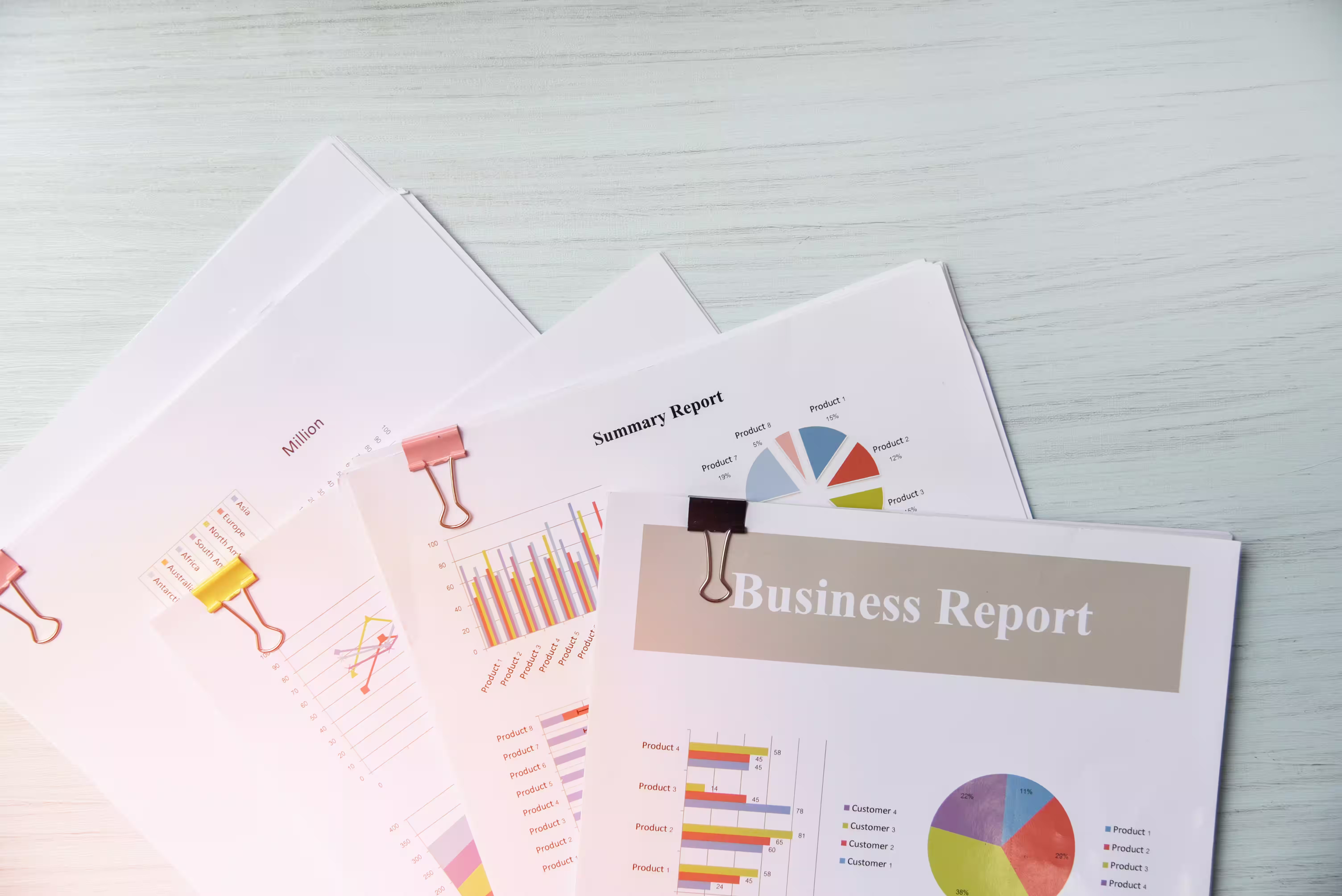
Types of Reporting Tools
Reporting tools come in various forms, each designed to meet specific needs and use cases. Here are some of the most common types:
- Self-service Tools: These tools empower users to build reports based on internal information without needing technical expertise. They are user-friendly and often feature drag-and-drop interfaces, making it easy for anyone to create reports.
- Data Visualization Tools: These tools excel at representing information graphically using elements such as maps, charts, and graphs. They help users quickly grasp complex data through visual means, making data analysis more intuitive.
- Business Intelligence Tools: These comprehensive tools help discover actionable insights using visual and interactive elements. They handle many tasks, like data analytics and data visualization. This makes them essential for making decisions based on data.
- Application Performance Tools: These tools focus on displaying data related to application performance and user metrics. They are essential for monitoring and optimizing the performance of software applications.
- Enterprise Tools: Designed for large-scale reporting needs, these tools offer high levels of security and flexibility. They can handle large amounts of data. Big organizations often use them for complex reporting needs.
- Finance-focused Tools: These specialized tools are designed for financial reporting and analysis. They organize and gather insights from financial records. This makes them perfect for financial teams. These teams want to track performance and follow the rules.
Top Report Generator Tools for Business
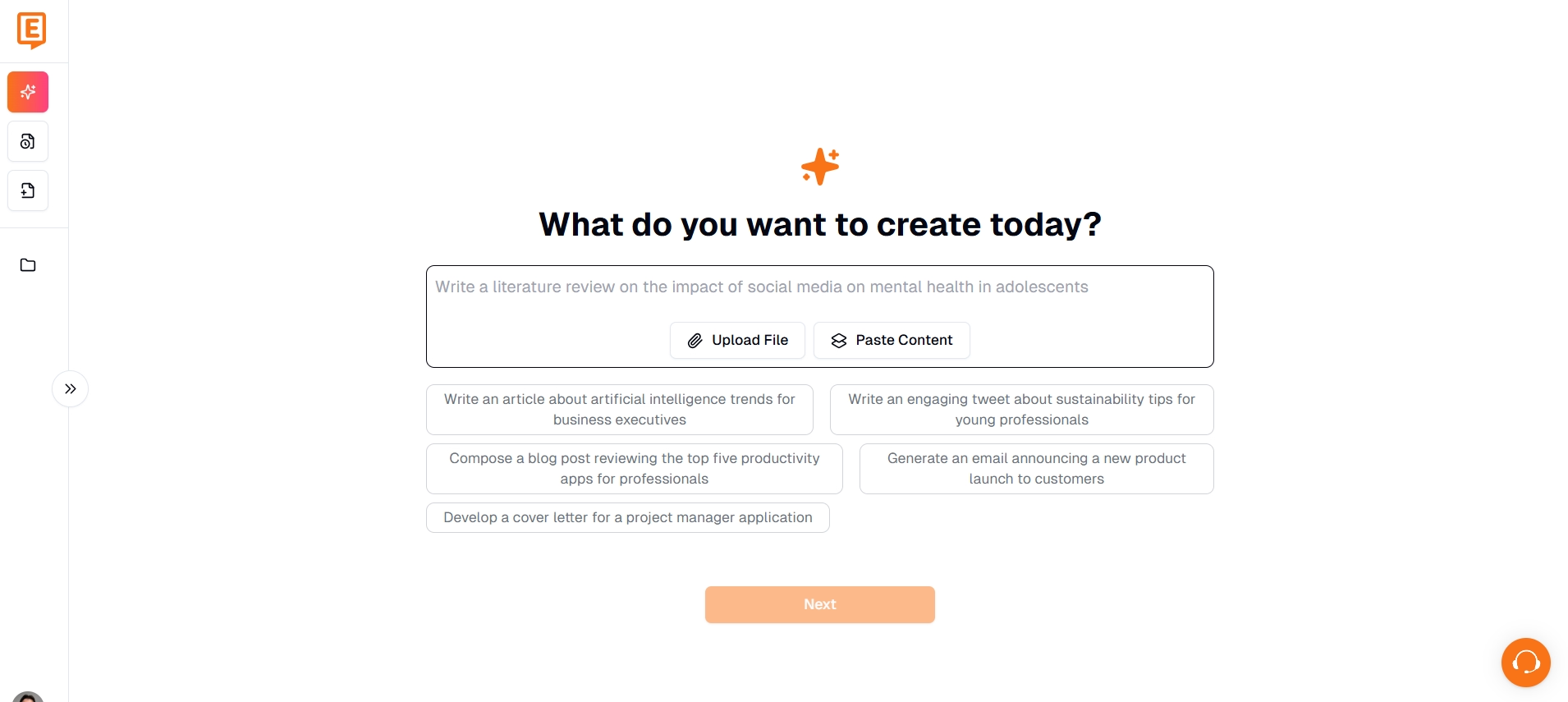
Eskritor: Leading the Way in Reporting Innovation
Eskritor stands out as the premier choice for businesses seeking comprehensive data reporting tools. This financial report creator excels through its intuitive interface and powerful features:
- Drag-and-drop report builder
- Advanced data visualization options
- Automated scheduling and distribution
- Custom branding capabilities
- Real-time collaboration features
- Multi-format export options
What sets Eskritor apart is its ability to handle complex reporting requirements while maintaining user-friendliness. The platform's reporting dashboard helps teams access and share insights easily across the organization.
Alternative Solutions
While Eskritor is a top choice for automated reporting, there are several alternative tools that cater to a variety of business needs. Below, we compare some notable options that provide unique features for different use cases:
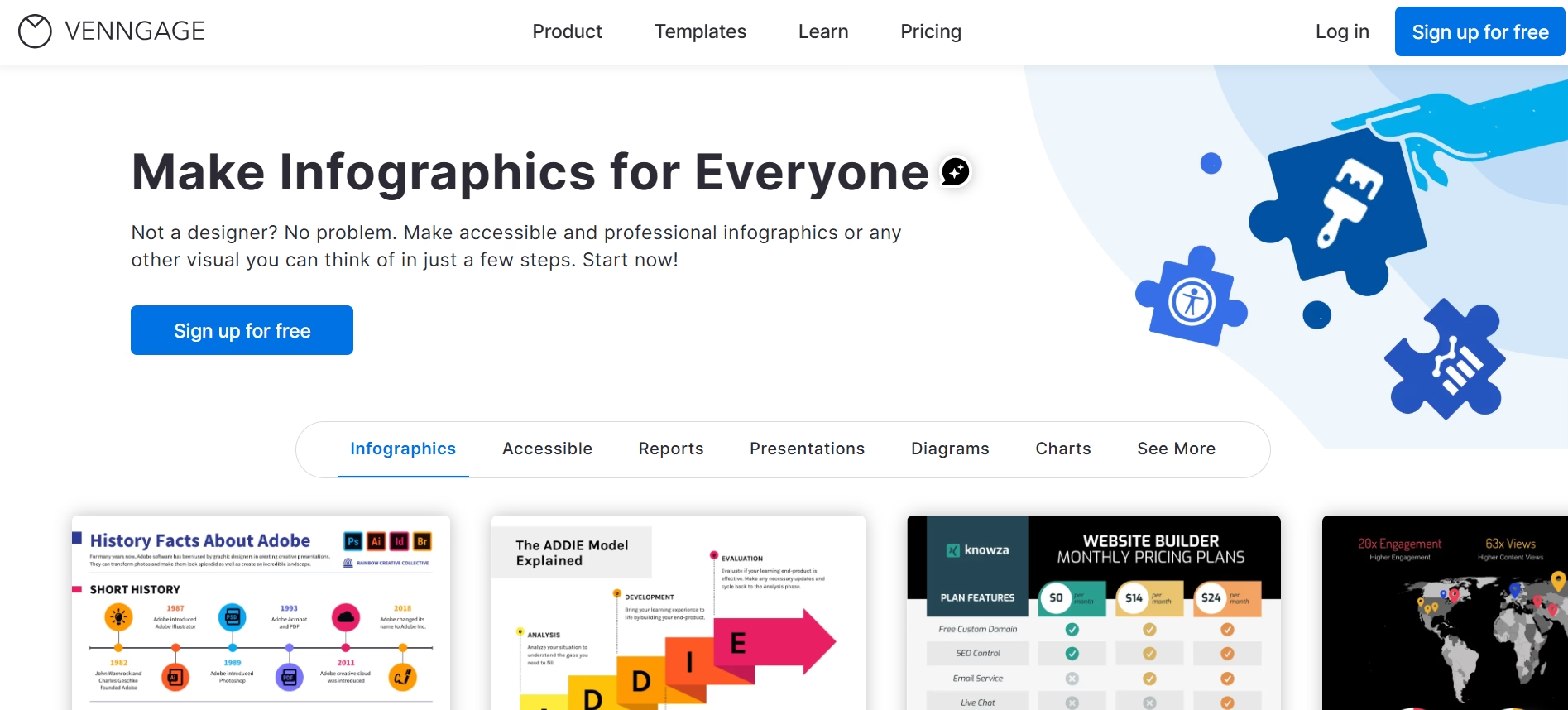
1. Venngage
Venngage simplifies report creation with its free AI Report Generator. This tool allows users to create visually appealing custom reports using simple prompts. It is ideal for marketing teams and professionals seeking well-designed templates for data presentation. Its standout features include:
- AI-powered design assistance
- Ready-to-use templates for reports, infographics, and presentations
- User-friendly drag-and-drop interface
Use Case: Best for users focused on creating highly visual and branded reports.
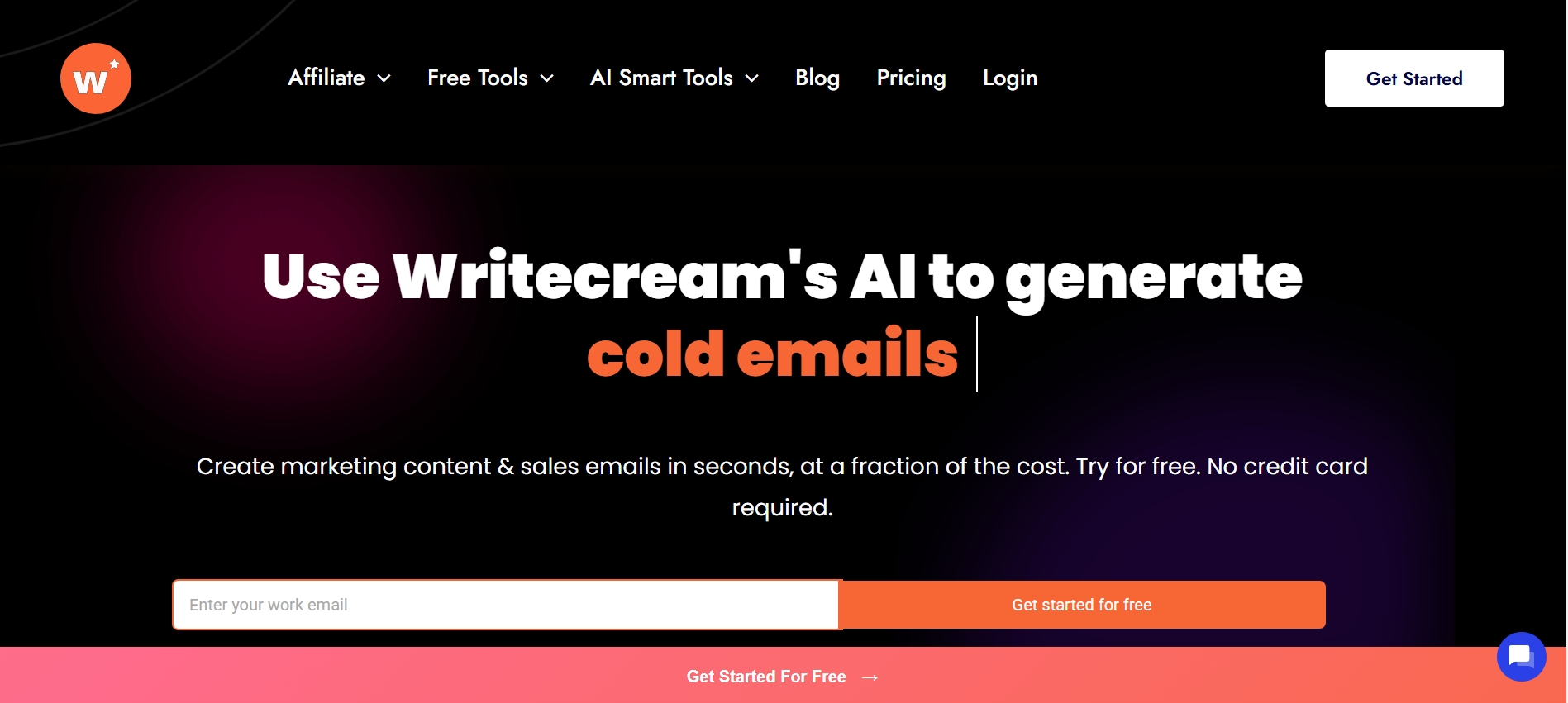
2. WriteCream
WriteCream offers an instant report generation tool that emphasizes ease of use. This platform provides pre-built templates and customization options, making it accessible to users with minimal design experience. Key highlights are:
- Quick generation of polished reports
- Customizable report designs to suit specific requirements
- Focus on simplicity and time-saving
Use Case: Ideal for small businesses and freelancers looking for quick, easy reporting solutions.
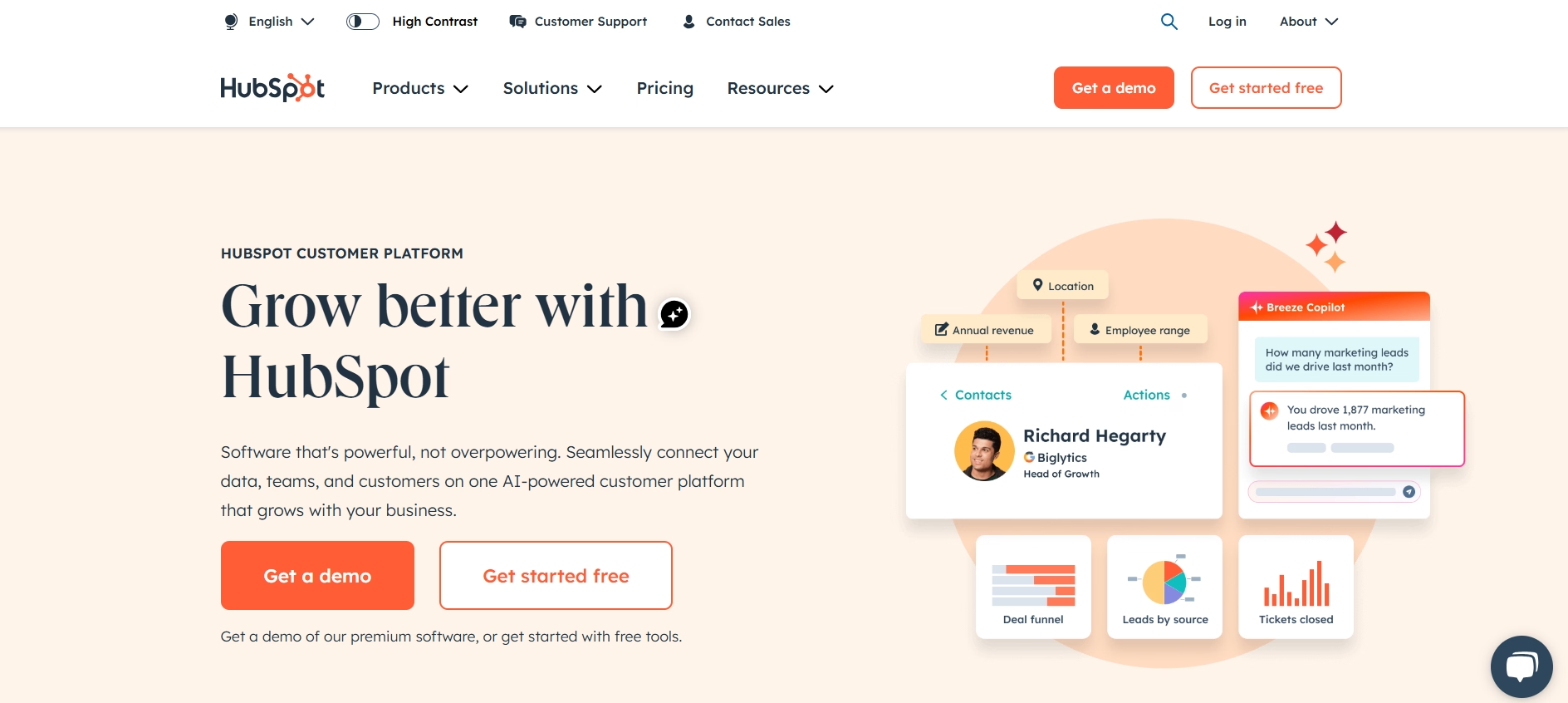
3. HubSpot's Custom Report Builder
HubSpot integrates reporting into its broader CRM and analytics suite. It pulls data from various marketing, sales, and customer service activities to provide actionable insights. Some of its standout features include:
- Seamless integration with HubSpot’s ecosystem
- Customizable dashboards and workflow automation
- Advanced data visualization tools
Use Case: Perfect for organizations already using HubSpot for CRM and marketing automation.
4. JasperReports
JasperReports is an open-source tool for Java developers, offering flexibility and customization for generating highly specific reports. While more technical in nature, it supports a range of output formats, such as PDF, Excel, and HTML. Notable features include:
- Open-source accessibility
- Multi-format report export
- Ability to integrate with Java applications
Use Case: Suited for technical teams and developers looking for in-depth customization.
5. Stimulsoft Reports
Stimulsoft is a comprehensive reporting solution that combines flexibility with powerful functionality. It includes a dynamic report designer, multiple export formats, and multi-platform compatibility. Key benefits include:
- Robust report designer for complex reporting needs
- Cross-platform compatibility (desktop, web, mobile)
- Integration with various programming environments
Use Case: Recommended for enterprises requiring advanced reporting and broad platform support.
Choosing the Right Report Generation Software
When evaluating reporting tools, consider these crucial factors:
Creating and saving custom templates can make future reporting tasks much faster. This is especially helpful for tracking key performance indicators. Customization options let businesses adjust their reports to meet specific needs. This ensures all important data is included and easy to access.
Data Source Integration
Your chosen solution should easily connect with your existing data sources. This includes databases, cloud services, and business applications. The best report template builder tools offer extensive integration capabilities out of the box.
Customization Options
Look for platforms that provide sufficient flexibility in report design and formatting. The ability to create and save custom templates can significantly speed up future reporting tasks.
Scalability
As your organization grows, your reporting needs will evolve. Ensure your chosen tool can handle increased data volumes and user demands without performance degradation.
Industry Applications of Automated Reporting
Automated reporting is useful in many industries. Each industry benefits from its ability to give timely and accurate insights
- Marketing: In the marketing realm, automated reporting tools help track website traffic, social media engagement, and campaign performance. Marketers can use these insights to optimize their strategies and make data-driven decisions that enhance their campaigns’ effectiveness.
- Finance: Financial teams rely on automated reporting to track performance, identify trends, and detect anomalies. These tools enable informed decision-making regarding investments and resource allocation, ensuring financial stability and growth.
- Healthcare: Healthcare professionals use automated reporting to track patient outcomes and identify areas for improvement. By analyzing data-driven insights, they can make informed decisions that enhance patient care and operational efficiency.
- Retail: Retailers benefit from automated reporting by tracking sales, inventory, and customer behavior. These insights help in making informed decisions about pricing, inventory management, and customer engagement, ultimately driving sales and customer satisfaction.
Maximizing Report Generator Efficiency with Report Automation
To get the most out of your reporting solution, take advantage of reporting automation and follow these best practices:
Template Standardization
Create a library of standardized templates for common reports. This ensures consistency across the organization while reducing the time needed to generate new reports.
Automated Scheduling
Take advantage of scheduling features to automate regular reports. This ensures timely delivery while reducing manual intervention.
Data Validation and Data Accuracy
Rules Implement data validation rules to catch potential errors before they appear in reports. This proactive approach maintains data quality and reliability.
Training and Documentation
Invest in proper training for team members and maintain updated documentation. This maximizes the value of your reporting tool investment.
Security and Compliance
Regular security audits and compliance checks ensure your reporting processes meet industry standards and regulations.
Integration Strategy
Develop a comprehensive integration strategy that connects your report generator with essential business systems:
- CRM platforms
- Financial Software
- Marketing tools
- Project management systems
- Business intelligence solutions

Overcoming Challenges in Automated Reporting
While automated reporting offers numerous benefits, it also presents certain challenges that organizations must address to fully leverage its potential:
- Data Quality: High-quality data is crucial for producing accurate and reliable reports. Organizations should invest in data quality initiatives, such as data cleansing and validation, to ensure their data is dependable.
- Data Integration: Integrating data from multiple sources can be challenging. Implementing data integration tools, such as APIs and data connectors, can streamline this process and ensure seamless data flow.
- Security: Protecting sensitive data is paramount. Organizations should use strong security measures. This includes encryption and access controls. These steps help protect their data and stop unauthorized access.
- User Adoption: Encouraging users to adopt new tools and processes can be difficult. Providing comprehensive training and support can help users become proficient with automated reporting tools, ensuring they are used effectively.
By addressing these challenges, organizations can maximize the benefits of automated reporting tools, leading to more efficient, accurate, and impactful reporting processes.
Success with Report Generation
To achieve success with your reporting solution:
- Start with clear objectives
- Implement gradually, beginning with critical reports
- Gather user feedback regularly to analyze data and optimize templates based on usage patterns
- Optimize templates based on usage patterns
- Monitor system performance and make adjustments as needed
Conclusion
In today’s fast-paced business world, efficient and automated reports are essential. They help companies stay competitive. The right report generator tool can change how your organization creates reports. It saves time and improves accuracy and insights.
Eskritor stands out as the comprehensive solution that addresses these needs, offering powerful automation capabilities, intuitive design features, and robust integration options. By choosing the right tool and following implementation best practices, you can significantly enhance your organization’s reporting capabilities and drive better business decisions.
Ready to transform your reporting process? Experience the power of automated reporting with Eskritor. Start your journey toward more efficient, accurate, and impactful business reporting today.
Frequently Asked Questions
Eskritor is an all-in-one report generation tool that automates complex reporting processes, offering customizable templates and real-time data integration.
Eskritor supports financial, business, and operational reports with customizable layouts to meet diverse professional needs.
By automating data integration and using standardized templates, Eskritor minimizes human error and ensures consistency.
Business professionals, managers, data analysts, and IT decision-makers looking for efficient and professional reporting solutions.





 location
location